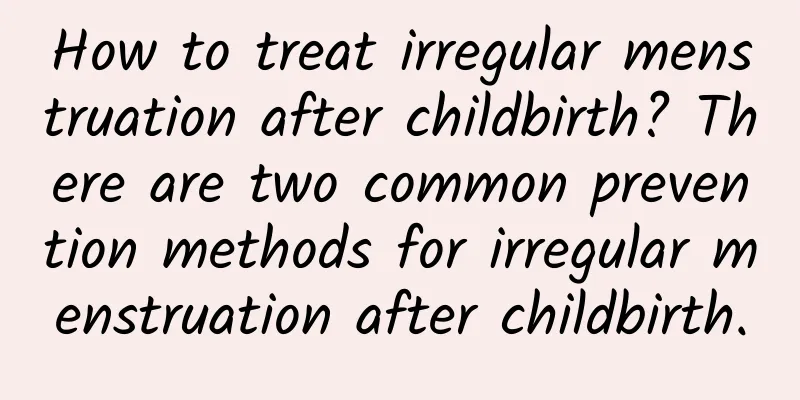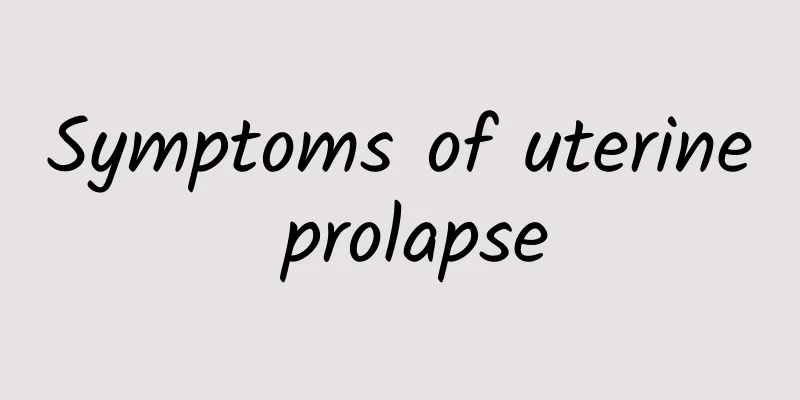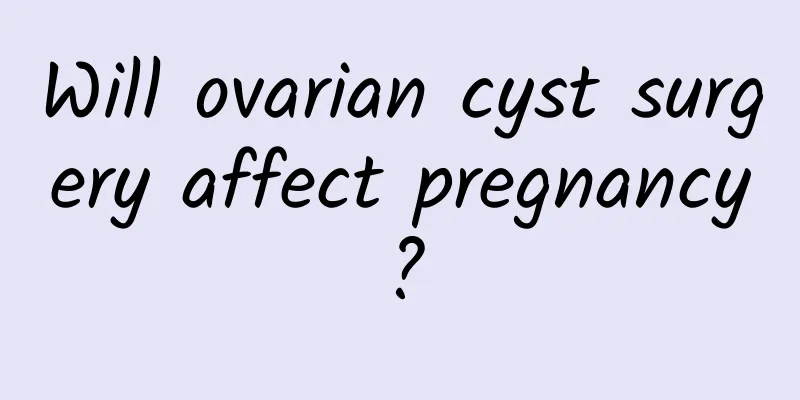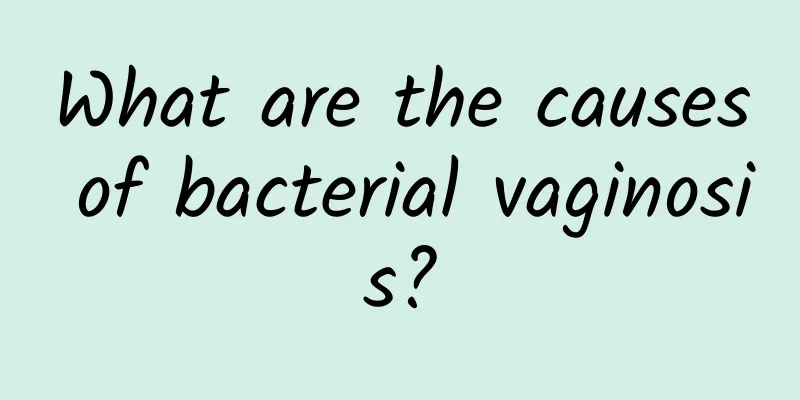How to treat irregular menstruation after childbirth? There are two common prevention methods for irregular menstruation after childbirth.

|
After a pregnant woman gives birth, her menstruation will gradually resume as her body recovers. Menstruation will resume early after the full moon, and will resume late after the baby is 1 year old. From a medical point of view, according to the tissue morphology of the endometrium, the ovaries may resume ovulation as early as 33 to 42 days after delivery. In addition, the corpus luteum after ovulation can also be observed within 6 weeks after delivery. If the new mother does not breastfeed, menstruation usually comes within 6 to 8 weeks after delivery. Research data show that 40% of new mothers who do not breastfeed resume ovulation 6 weeks after delivery; 8 to 12 weeks after delivery, only 35% of new mothers do not resume ovulation and menstruation. About 25% of new mothers who breastfeed will resume ovulation and menstruation 12 weeks after delivery. Most new mothers who breastfeed usually take 18 weeks to fully resume ovulation function. There are three main manifestations of irregular menstruation in new mothers after childbirth: 1. Irregular menstrual periods reason Irregular menstruation after childbirth is mainly caused by neuroendocrine dysfunction, organic diseases or drugs. Endocrine dysfunction such as thyroid and adrenal cortex dysfunction, diabetes, etc.; organic diseases include local inflammation, tumors, developmental abnormalities, malnutrition, etc.; drug factors such as the use of endocrine preparations may lead to irregular menstruation after childbirth. Preventive treatment methods Usually, you should pay attention to proper calcium supplementation, get more rest, strengthen nutrition, and exercise properly, so that you can play a certain preventive role. If you have irregular menstruation for a long time, it is recommended to go to the hospital to find out the specific cause and then do corresponding treatment. TIPs: New mothers can adjust themselves according to their actual situation: 1. Pay attention to staying happy. Depression or depression often reduces menstrual flow or even causes amenorrhea, while emotional stress increases menstrual flow and causes early menstruation. 2. Participate in activities and avoid being too comfortable and lazy. In addition, take more rest and avoid overwork which is bad for your health. 3. Medication and diet therapy can reduce the damage of vegetarianism to the human body, and can also "replenish essence and qi" to improve the treatment effect. 2. Less menstrual blood reason Some new mothers have normal menstrual cycles after childbirth, but the menstrual flow is very small, or even a little complete, which is the symptom of "oligomenorrhea". The main reasons are ischemia or traumatic bleeding, such as postpartum hemorrhage can cause ischemia, leading to oligomenorrhea; congenital deficiency of kidney qi and kidney essence, excessive childbirth damages the kidney, leading to insufficient kidney qi, and ultimately oligomenorrhea; sometimes endocrine is normal, uterine dysplasia, reduced ovarian hormone stimulation response, or partial adhesion of the endometrium, oligomenorrhea. Preventive treatment methods Prevention is generally the main means, and new mothers should pay attention to the following aspects: try to avoid surgery that damages the endometrium; use contraceptive measures such as birth control pills alternately, and avoid long-term use of birth control pills, which may lead to excessive suppression of pituitary function. TIPs: What is the normal menstrual volume? The normal menstrual volume for women is about 30ml and 50ml, but it is not fixed and varies from person to person. How to judge whether the menstruation is heavy or light? If you have anemia after each menstruation, there is a problem. You should go to the hospital for treatment as soon as possible; if you do not have anemia and it does not affect your energy and daily life, it is necessary to treat it. 3. Excessive menstrual bleeding reason If a new mother has regular menstruation after childbirth, but the amount of bleeding is heavy each time, it means menorrhagia. Menorrhagia is mainly caused by organic diseases such as uterine fibroids, but the most common cause is ovulation DUB. Under normal circumstances, the amount of menstrual blood in a menstrual cycle generally does not exceed 30ml~50ml. If it exceeds 80ml, it can be diagnosed as menorrhagia. The amount of menstrual blood in each menstrual cycle is different, and you can only judge it according to your own situation. Preventive treatment methods There are many ways to treat heavy menstruation, including surgical treatments such as hysterectomy and endometrial ablation. In addition, there are a number of medications that can treat heavy menstruation, such as oral medications or medications released by an intrauterine device. Medication is often used to treat heavy menstruation after childbirth. TIPs: New mothers should never use drugs indiscriminately. Before deciding on a treatment plan, you should find out the cause of excessive menstruation. Taking drugs on your own initiative may cause serious side effects. Some new mothers are eager to seek treatment for irregular menstruation and use hormone treatment, which aggravates the condition. If you do not understand the use and indications of sex hormones correctly or do not use the drugs according to the doctor's orders, it often causes menstrual disorders, heavy bleeding or other complications. Therefore, it is not advisable to abuse sex hormones to treat irregular menstruation. |
>>: Will dieting cause irregular menstruation? 4 reasons for irregular menstruation
Recommend
What to eat after exercise? Nutritionists recommend convenience store "protein fiber meals" that can help build muscle and reduce fat
Were you bored from the epidemic prevention work ...
What is the best medicine for Bartholinitis?
The occurrence of Bartholin's gland inflammat...
Experts explain several different symptoms of vaginitis
There are many types of vaginitis in clinic, such...
What are the misunderstandings about dysmenorrhea
I believe everyone has heard of dysmenorrhea, and...
Just 30 minutes of circular exercise can keep you healthy and warm in autumn and winter without getting fat
It is a period of climate change, preparing to en...
What should women do if they have cervical erosion? Common knowledge on how to prevent cervical erosion in women
Cervical erosion is a common gynecological diseas...
The occurrence of ovarian cysts is related to endocrine factors
I think women should know about ovarian cyst dise...
Sugar-restricted diet whirlwind! Beware of ketoacidosis when losing weight
Obesity is the public enemy. In recent years, Jap...
What are the main features of abortion surgery?
Although we often hear about abortion, we don’t k...
Detailed introduction to common methods of treating vulvar leukoplakia
Nowadays, vulvar leukoplakia is more and more com...
Which hospital is better for pelvic peritonitis?
Pelvic peritonitis is not a serious disease, but ...
Lose weight after the New Year with this! Drinking water before meals helps lose weight
To lose weight after the New Year, seize the 30-d...
What are the drugs for treating uterine fibroids?
If uterine fibroids are not treated in time, it w...
What are the abnormal leucorrhea tests?
What are the tests for abnormal leucorrhea? If yo...
Introduction to common diagnostic methods for cervical precancerous lesions
Cervical precancerous lesions are a type of cance...









